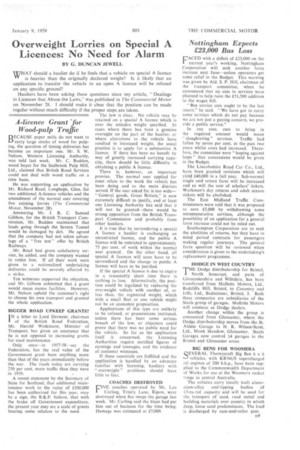Overweight Lorries on Special A Licences: No Need for Alarm
Page 53

If you've noticed an error in this article please click here to report it so we can fix it.
BY G. DUNCAN JEWELL
WHAT should a haulier do if he finds that a vehicle on special A licence is heavier than the originally declared weight? Is it likely that an application to transfer the vehicle to an open A licence will be refused on any specific ground?
Hauliers have been asking these questions since my article, "Dealings
in Licences that Abuse the Laws," was published in The Commercial Motor
on November 28. I should make it clear that the position can be made regular without much difficulty if the proper steps are taken.
The law is clear. No vehicle may he retained on a special A licence which is over the unladen weight specified. In cases where there has been a genuine oversight on the part of the haulier, or where alterations to the vehicle have resulted in increased weight, the usual practice is to apply for a substantive A licence. If there has been no benefit by way of greatly increased carrying capacity, there should be little difficulty in obtaining a public A licence. There is, however, an important proviso. The normal user applied for must relate to the work the vehicle has been doing and to the main districts served. lf the user asked for is too wide— "General goods, Great Britain," is now extremely difficult to justify, and at least one Licensing Authority has said that it will not be granted—there would be strong opposition from the British Transport Commission and probably from other hauliers. It is true that by surrendering a special A licence a haulier is exchanging an unrestricted licence, and the public A licence will be restricted to approximately 75 per cent. of work within the normal user granted. _ On the other hand, all special A licences will soon have to be surrendered and the change to public A licence will have to be justified. If the special A licence is due to expire in a reasonably short time there is nothing to lose. Alternatively, the position could be legalized by replacing the overweight vehicle with another of, or less than, the registered weight, which with a small fleet or one vehicle might not be an economic proposition. Applications of this type are unlikely to be refused, or prosecutions instituted, unless there has been some serious breach of the law, or objectors could prove that there was no public need for the vehicle. So far as the application itself is concerned, the Licensing Authorities require certified figures of earnings and tonnages, and the evidence of customer witnesses. If these essentials are fulfilled and the application is handled by an advocate familiar with licensing, hauliers with " overweight " problems should have little to fear.
























































































































